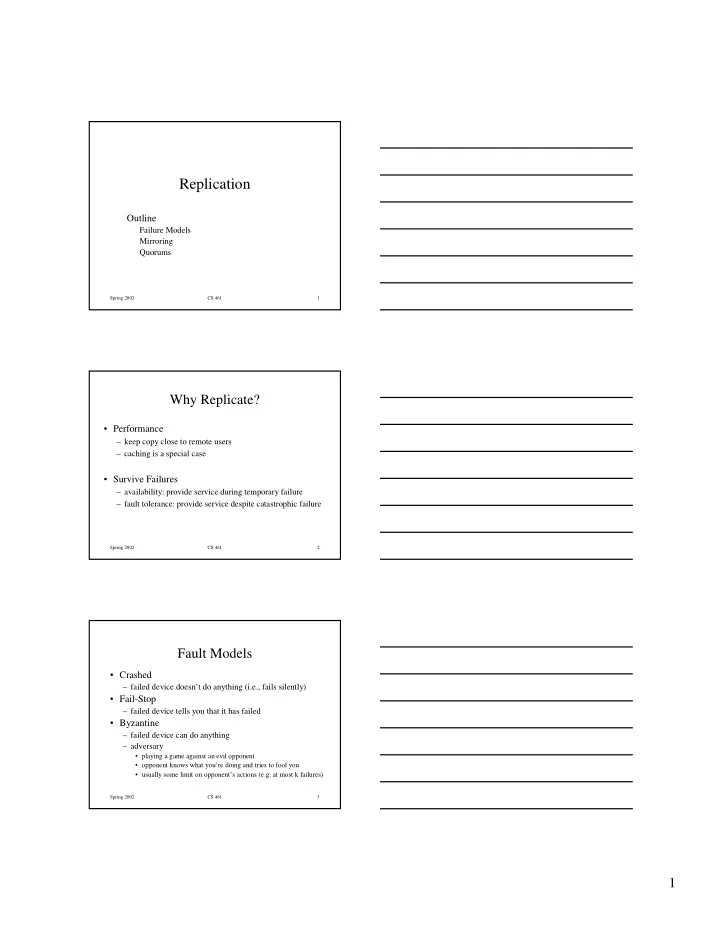

Replication Outline Failure Models Mirroring Quorums Spring 2002 CS 461 1 Why Replicate? • Performance – keep copy close to remote users – caching is a special case • Survive Failures – availability: provide service during temporary failure – fault tolerance: provide service despite catastrophic failure Spring 2002 CS 461 2 Fault Models • Crashed – failed device doesn’t do anything (i.e., fails silently) • Fail-Stop – failed device tells you that it has failed • Byzantine – failed device can do anything – adversary • playing a game against an evil opponent • opponent knows what you’re doing and tries to fool you • usually some limit on opponent’s actions (e.g. at most k failures) Spring 2002 CS 461 3 1
Byzantine Army Problem 3000 3000 Blue Blue Soldiers Soldiers 4000 Red Soldiers Spring 2002 CS 461 4 Synchrony • Assumptions concerning boundedness of component execution or network transmissions • Synchronous – always performs function in a finite & known time bound • Asynchronous – no such bound • Famous Result: A group of processes cannot agree on a value in an asynchronous system given a single crash failure Spring 2002 CS 461 5 Network Partitions • Can’t tell the difference between a crashed process and a process that’s inaccessible due to a network failure. • Network Partition: network failure that cuts processes into two or more groups – full communication within each group – no communication between groups – danger: each group thinks everyone else is dead Spring 2002 CS 461 6 2
Mirroring • Goal: service up to K failures • Approach: keep K+1 copies of everything • Clients do operations on “primary” copy • Primary makes sure other copies do operations too • Advantage: simple • Disadvantages: – do every operation K times – use K times more storage than necessary Spring 2002 CS 461 7 Mirroring Details • Optimization: contact one replica to read • What if a replica fails? – get up-to-date data from primary after recovering • What if primary fails? – elect a new primary Spring 2002 CS 461 8 Election Problem • When algorithm terminates, all non-failed processes agree on which replica is the primary • Algorithm works despite arbitrary failures and recoveries during the election • If there are no more failures and recoveries, the algorithm must eventually terminate Spring 2002 CS 461 9 3
Bully Algorithm • Use fixed “pecking order” among processes – e.g., use network addresses • Idea: choose the “biggest” non-failed machine as primary • Correctness proof is difficult Spring 2002 CS 461 10 Bully Algorithm Details • Process starts an election whenever it recovers or whenever primary has failed – how know primary has failed? • To start an election, send election messages to all machines bigger than yourself – if somebody responds with an ACK, give up – if nobody ACKs, declare yourself the primary • On receiving election message, reply with ACK and start an election yourself (unless in progress) Spring 2002 CS 461 11 Quorums • Quorum: a set of server machines • Define what constitutes a “read quorum” and a “write quorum” • To write – acquire locks on all members of some write quorum – do writes on all locked servers – release locks • To read: similar, but use read quorum Spring 2002 CS 461 12 4
Quorums • Correctness requirements – any two write quorums must share a member – any read quorum and any write quorum must share a member (read quorums need not overlap) • Locking ensures that – at most one write happening at a time – never have a write and a read happening at the same time Spring 2002 CS 461 13 Defining Quorums • Many alternatives • Example – write quorum must contain all replicas – read quorum may contain any one replica • Consequence – writes are slow, reads are fast – can write only if all replicas are available – can read if any one replica is available Spring 2002 CS 461 14 Defining Quorums (cont) • Example: Majority Quorum – write quorum: any set with more than half the replicas – read quorum: any set with more than half the replicas • Consequences – modest performance for read and write – can proceed as long as more than half the replicas are available Spring 2002 CS 461 15 5
Quorums & Version Numbers • Write operation writes only a subset of the servers – some servers are out-of-date • Remedy – put version number stamp on each item in each replica – when acquiring locks, get current version number from each replica – quorum overlap rules ensure that one member of your quorum has the latest version Spring 2002 CS 461 16 Version Numbers (cont) • When reading, get the data from the latest version number in your quorum • When writing, set version number of all replicas you wrote equal to 1 + (max version number in your quorum beforehand) • Guarantees correctness even if no recovery action is taken when replica recovers from a crash Spring 2002 CS 461 17 Quorums and Partitions • One group has a write quorum (and thus usually a read quorum); – that group can do anything – other groups are frozen • No group has a write quorum, but some groups have a read quorum – some groups can read – no groups can write • No group contains any quorum – everyone is frozen Spring 2002 CS 461 18 6
Recommend
More recommend